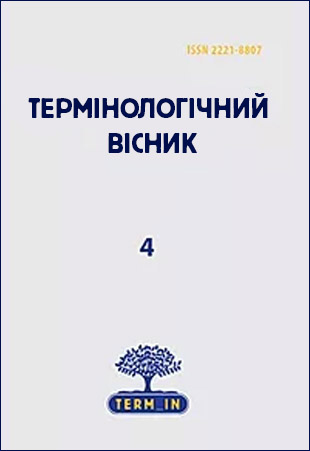Conceptual Synonymy in Syntactic Terminology: Semantic Variations of the Term obstavyna

Founders
National Academy of Sciences of Ukraine,
Institute of Ukrainian Language of NAS
Publisher
Institute of the Ukrainian Language of National Academy of Sciences of Ukraine
Scientific journal Ukrainian Language is registered by the Ministry of Justice of Ukraine as print media (Certificate: Series КВ № 12180 – 1064 ПР of January 12, 2007).
Included in the list of printed scientific specialized editions of Ukraine (Order of MES of Ukraine no528 from 12.05.2015)
Back side of the journal
Oksana Vasetska
Information about the author:
Junior Researcher of Grammar and Terminology Department of the Ukrainian Language Institute of NAS of Ukraine
e-mail: oksana.vasetska.04@gmail.com
Title: Conceptual Synonymy in Syntactic Terminology: Semantic Variations of the Term obstavyna
Rubric: Terminology of Linguistic and Related Sciences
Abstract: The article reveals a section of terminological units of the variology, the analysis is given in specialized dictionaries and reference books in linguistics, i.e. it deals with the status of synonyms and variants in general variance theory, in particular, synonymy is recognised as a semantic variation and traditional variation is declared as a formal expression of a broader category of variability.
The common phenomenon of describing a concept by several names is variability. It distinguishes into synonymy and doubling by such criterion as the interchangeability of terms in contexts. The way to avoid the terminological coincidence of terms which describe the general features of the language system and refer the indicator of the formal distinction of identical units by the meaning is proposed.
The phenomenon of the conceptual synonymy on the example of such terms as modifier, adjunct, determinant etc. is analysed. This research is based on the following algorithm: 1) to clarify the definition of the terms; 2) to establish the belonging to the scientific school, theories, concepts; 3) to observe the significative differences of the terms; 4) to reveal the syntagmatic characteristics of these units.
The classification of the terminological variants is examined. The features of the semantics of syntactical terms with similar meaning are clarified.
In conclusion, the author makes an attempt to solve the problem within the undertaken research. Considering the different approaches to the studying phenomenon, the presence of a diffuse denotatum and common signification, the terms modifier, adjunct, determinant etc. are qualified as conceptual synonyms. In addition, the common shades of meaning of terms denote the varieties of modifiers. It correlates with terms that describe the components of semantic and syntactic structure of sentences.
Keywords: terminology, syntactical terminology, variance, synonymy, conceptual synonymy (quasi-synonymy).
References:
- Vykhovanets, I.R. (2004). Determinantni chleny rechennia. In Ukrainska mova : Entsyklopediia (2004). (pp. 139). Kyiv: Vyd-vo “Ukr. entsykl.” im. M. P. Bazhana (in Ukr.).
- Vykhovanets, I.R. (2004).Obstavyna. In Ukrainska mova: Entsyklopediia (2004). (pp. 423). Kyiv: Vyd-vo “Ukr. entsykl.” im. M. P. Bazhana (in Ukr.).
- Vykhovanets, I.R. (2005) Studii pro chleny rechennia: pryrechennievyky. Ukrainska mova, 2005, № 2, 22–27 (in Ukr.).
- Hanych, D.I. (1985). Slovnyk linhvistychnykh terminiv. Kyiv: Vyshcha shkola (in Ukr.).
- Golovanova, E.I. (2013). Kognitivnoe terminovedenie: problematika, instrumentarij, napravleniya i perspektivy razvitiya. Vestnik CHelyabinskogo gos. un-ta. Filologiya. Iskusstvovedenie, 2013, № 24 (315),Vyp. 82, 13–18. Retrieved from http://cyberleninka.ru/article/n/kognitivnoe-terminovedenie-problematika-instrumentariy-napravleniya-i-perspektivy-razvitiya (in Rus.).
- 6. Huivaniuk, N.V. (1999). Formalno-semantychni spivvidnoshennia v systemi syntaksychnykh odynyts : [monohrafiia]. Chernivtsi: Ruta (in Ukr.).
- Iermolenko, S.Ya. (2001). Ukrainska mova: korotkyi tlumachnyi slovnyk linhvistychnykh terminiv. Kyiv: Lybid (in Ukr.).
- Zahnitko, A.P. (2012). Slovnyk suchasnoi linhvistyky: poniattia i terminy : u 4 t. (Vol. 1–4). Donetsk : DonNU (in Ukr.).
- Zolotova, G.A. (1973). Ocherk funkcional’nogo sintaksisa russkogo yazyka. Moscow: Nauka (in Rus.).
- Ivanova, G.A. (2010). O semanticheskoj ekvivalentnosti terminologicheskih edinic (na materiale metayazyka lingvistiki). Terminologiya i znanie. Materialy ІІ Mezhdunarodnogo simpoziuma (Moscow, May 21–22, 2010) (p. 181–191). Moscow: Izdatel’skij centr “Azbukovnik” (in Rus.).
- Lemov, A.V. (2000). Sistema, struktura i funkcionirovanie nauchnogo termina (na materiale russkoj lingvisticheskoj terminologii) [Doctoral thesis]. Saransk (in Rus.).
- Lotte, D.S. (1961). Osnovy postroeniya nauchno-tekhnicheskoj terminologii: Voprosy teorii i metodiki. Moscow: Izd-vo AN SSSR (in Rus.).
- Martyniuk, A.P. (2011). Slovnyk osnovnykh terminiv kohnityvno-dyskursyvnoi linhvistyky. Kharkiv: KhNU imeni V.N. Karazina (in Ukr.).
- Selivanova, O. (2006). Suchasna linhvistyka: terminolohichna entsyklopediia. Poltava: Dovkillia-K (in Ukr.).
- Suchasna ukrainska literaturna mova. Syntaksys (1972). Kyiv: Naukova dumka (in Ukr.).
- Ten’er, L. (1988). Osnovy strukturnogo sintaksisa. Moscow: Progress (in Rus.).
- Chernobrov, Yu.A. (2013). Syntaksychnyi termin yak obiekt doslidzhennia v ukrainskomu istorychnomu terminoznavstvi. Terminolohichnyi visnyk, 2013, Vyp. 2 (1),122–128 (in Ukr.).
- Iuzhakova, O.I. (2009). Suchasnyi stan terminolohii kholodylnoi tekhniky. Naukovi pratsi. Seriia: Filolohiia. Movoznavstvo : naukovo-metodychnyi zhurnal, 2009, Vol. 105, #92, 150–154 (in Ukr.).


